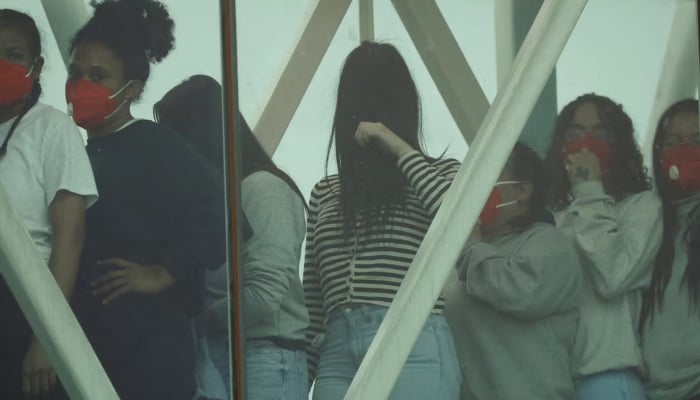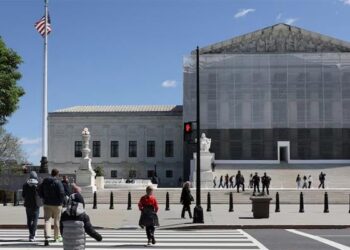Select Language:
The United States Supreme Court upheld its decision to block President Donald Trump’s deportation of Venezuelan migrants under a law from 1798, which has traditionally been applied only during wartime. The court critiqued the Trump administration for attempting to deport these individuals without sufficient legal procedures.
In a brief and unsigned statement, the justices granted a request from lawyers of the American Civil Liberties Union (ACLU), representing the migrants, to maintain the suspension of deportations for the time being. Previously, on April 19, the court had ordered a temporary pause on the deportations of several migrants held at a detention center in Texas.
These deportations are part of Trump’s broader immigration policy since he resumed office in January.
ACLU attorneys urged the Supreme Court to step in after reporting on April 18 that the current administration was preparing to deport the migrants without giving them the proper notice or an opportunity to challenge the actions.
The justices agreed with this concern, stating, “Providing notice roughly 24 hours before removal, without any guidance on how to uphold due process rights to contest that removal, clearly does not meet legal standards,” they wrote in the ruling.
Generally, due process requires the government to give notice and allow for a hearing prior to implementing certain negative actions.
Trump expressed his discontent with the Supreme Court’s decision via social media, declaring, “This is a troubling and dangerous day for America!” The president lamented that undocumented immigrants, whom he claims have committed crimes, are not able to be removed without going through a lengthy and costly legal process, which could span years. He also argued that the ruling might encourage other criminals to unlawfully enter the country.
Conservative justices Samuel Alito and Clarence Thomas expressed their dissent regarding Friday’s decision. Alito noted in his dissent that he believed the Supreme Court lacked the authority to intervene at this point in the case and questioned whether collectively granting relief to the detainees was even legal.
The Supreme Court, which leans towards a 6-3 conservative majority, instructed the 5th U.S. Circuit Court of Appeals, located in New Orleans and responsible for cases coming from Texas, to ascertain the necessary legal procedures for the migrants to ensure compliance with constitutional requirements.
The court clarified that the administration retained the option to pursue deportations under other parts of U.S. immigration law.
The interests at stake for the detainees were deemed “particularly significant,” especially considering a separate claim made by the Trump administration that it could not return a Salvadoran man, who had lived in Maryland but was mistakenly deported to El Salvador, according to Friday’s ruling.
‘A major reprimand’
Lee Gelernt, the lead attorney from the ACLU in this case, welcomed the ruling with optimism.
“The court’s decision to halt deportations serves as a major reprimand to the government’s attempt to quickly transport individuals to a prison in El Salvador under harsh conditions. Using wartime authority during peacetime without due process raises critical concerns,” Gelernt stated.
The administration has been sending deportees to El Salvador, where they face detention in the nation’s maximum-security anti-terrorism facility, backed by a $6 million agreement with President Nayib Bukele’s government.
The government accused these migrants of belonging to Tren de Aragua, a criminal gang originating in Venezuelan prisons that the State Department has labeled as a foreign terrorist organization. Trump relied on the Alien Enemies Act to expedite their deportations.
Family members of many deported Venezuelans, along with their legal representatives, have refuted the claims of gang affiliation, stating that they were never afforded the opportunity to contest the government’s assertions.
The Alien Enemies Act grants the president the authority to deport, detain, or impose restrictions on individuals who owe primary allegiance to a foreign entity and may pose a national security risk during wartime. The law was last employed during World War II to intern and deport individuals of Japanese, German, and Italian descent.
This marks the second instance in which Trump’s initiatives regarding Venezuelan migrants have been brought before the Supreme Court, raising serious questions about his administration’s respect for the limitations set by the nation’s highest court.
Lawyers for the migrants argued that officials did not provide those held at the Bluebonnet immigration detention facility with the chance for judicial review to challenge the removals before many were placed on buses heading to the airport — in direct contradiction to a previous ruling by the justices.
Back on April 7, the Supreme Court had restricted how deportations under the Alien Enemies Act could be conducted, even as the law’s application for this purpose remains under legal scrutiny. The justices mandated that detainees should receive notice “within a reasonable timeframe and in a manner” that allows them to contest the legality of their deportation.






